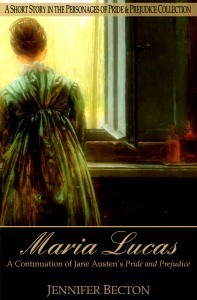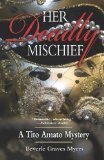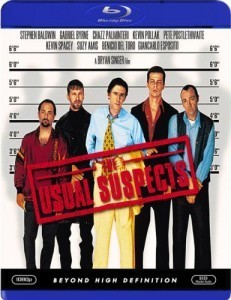Jennifer Becton's Blog, page 56
May 16, 2011
Opera, Venice, and Mystery
 Meet Beverle Graves Myers. Beverle is a wonderful friend, who happens to be a relative on my husband's side of the family, and she has been kind enough to serve as one of my writing mentors over the past few years. She has played the role of the story editor on Charlotte Collins, Caroline Bingley, and Absolute Liability (even though it was not her preferred subgenre). And she is the best! Beverle does not offer her services as an editor to the general public, so I feel very fortunate every time she agrees to read my work.
Meet Beverle Graves Myers. Beverle is a wonderful friend, who happens to be a relative on my husband's side of the family, and she has been kind enough to serve as one of my writing mentors over the past few years. She has played the role of the story editor on Charlotte Collins, Caroline Bingley, and Absolute Liability (even though it was not her preferred subgenre). And she is the best! Beverle does not offer her services as an editor to the general public, so I feel very fortunate every time she agrees to read my work.

Beverle is a published author of five historical mystery novels in the Tito Amato Series, which is set in the operatic world of Venice. Her short stories have appeared in Alfred Hitchcock Mystery Magazine, Woman's World, and numerous anthologies. She has earned nominations for the Macavity Award, Kentucky Literary Award, and Derringer Award. Now, you all know how much I love to focus on the least obvious characters as heroes, so it shouldn't surprise you that my writing mentor's hero is also unusual; he is a castrato soprano.
Here is a list of her Tito Amato books, which are published by Poisoned Pen Press, in order:
Interrupted Aria (Tito Amato Mysteries)

Painted Veil (The Baroque Mysteries)

Cruel Music (The Baroque Mysteries)

Her Deadly Mischief (Tito Amato Mysteries)

Everyone please check out Beverle's books.
Beverle, thank you for all your hard work on Caroline Bingley. I really appreciate it!
May 12, 2011
Interview at A Writer Forever

AvidWriterLives blogs at A Writer Forever
Recently, I had the honor to be interviewed for the blog A Writer Forever. I was able to talk more about Charlotte Collins and to introduce my upcoming novels Caroline Bingley and Absolute Liability. I'd love to see you over there, and don't forget to follow the blogger AvidWriterLives on Twitter.
Also, a few announcements:
Caroline Bingley is on the way back from the story editor. I'm nervous!
Charlotte Collins has hit 3,500 sales! I'm proud since so many JA sequels have come out recently. Lots of good competition out there.
"Maria Lucas" has sold 300 copies in the two months or so it's been out!
That's all the news that's fit to print. Have a great day!
May 11, 2011
How NOT to Do It
My husband recently showed me this video montage from the King of Queens in which Lou Ferrigno moves in next door to the family. This excites Arthur (Jerry Stiller) because he has a screenplay–Reconsidering Sandy–he'd like to show Lou.
So enjoy how NOT to pitch your manuscript:
Of course, if you choose to self-publish, you'll never have to worry about pitching it to anyone but your readers. And there are also several lessons to be learned about that too. I won't spoil it for you.
May 9, 2011
Publishing Fear Free: Book Promotion
 In a rather timely coincidence, J. A. Konrath blogged about ebook promotion on the same day that I experienced my first book promotional flop. In October 2010, I purchased a Kindle Boards Book Sponsorship, which is basically a small ad at the top of an ebook discussion board. I had read many authors had success with this promotion, but the first available date was May 7. I took it.
In a rather timely coincidence, J. A. Konrath blogged about ebook promotion on the same day that I experienced my first book promotional flop. In October 2010, I purchased a Kindle Boards Book Sponsorship, which is basically a small ad at the top of an ebook discussion board. I had read many authors had success with this promotion, but the first available date was May 7. I took it.
I expected to see a modest jump in sales on May 7, but instead, I had the worst sales day of the whole week. Strange. But I'm not terribly upset at the waste of advertising dollars because this gives me valuable information for the future. This was not the correct place to promote Charlotte Collins, so I won't be using this particular venue again for similar books.
Take a few minutes to read Konrath's post, and in addition, I'd like to emphasize the importance of choosing quantifiable promotions. You must be able to see concrete results from your advertising dollars; you must be able to see a direct relationship between your ad and your sales. So here are some things I've found important:
Choose limited-time promotions. There are many one- or two-day promotions out there, and many of them are free. If you limit the time of your promo, you will be able to see an instant, direct relationship between it and your sales.
If you choose a long-term promotion–like running a month-long ad–be sure that you will have access to its results, like having a spreadsheet or chart of your ad's clicks. Otherwise, you are not going to know if your ad is effective. You can't prove that any sales correlate to it directly. Goodreads is a good example of a long-term ad program that does it well.
Sure, there's something to be said for having your book "out there" for people to see in a long-term ad even if you can't prove that it's getting any sales results. Part of advertising is getting your book in someone's head, but there are lots of free ways to get the job done. If you can't prove your paid ad is working, why bother? You're just wasting money.
As Konrath says, sales fluctuate, and authors shouldn't panic as this happens: "Ebooks are forever, and forever is a long time."
May 5, 2011
Don't Forget the Other Stuff
I've dedicated this year to getting three–yes, three (3)!?!–books out. Yes, I am insane, but I am a firm believer in seizing the opportunities that come. And being an author is my dream, and the opportunity is now. Dreams don't come true through dreaming; they come true through hard work. And I'm willing to do it.
In the past six months, I've written 60,000 words and am now in the final stages of two manuscripts. I maintain my editing work and (generally) manage to keep the cat hair in my house down to a minimum. But I don't take a lot of time off.
With Caroline Bingley in the hands of my story editor, I turned to Absolute Liability, which I'm really excited about. I just have to make the final corrections to the story, have it proofed, and format it for paperback and ebook. It's that close.
But the barn was calling. I haven't ridden my horse in months because I've been working so much. Yesterday, I rode my Darcy, and it reminded me how important the "other stuff" is. Yes, we all have work, and it is fulfilling in itself, but we shouldn't forget the other things that feed our spirits.
So I'll be getting in some quality horse time from now on, and I hope my writing will be all the better for it.
Here's a little video of "the other stuff" in my life. I'm teaching her a cue to come to me, and this is her walking to me from across the arena. I was pretty excited. LOL
May 3, 2011
Writing Fear Free: Critiques
 Books are not babies, but hearing criticism of a newborn manuscript can often feel almost as personal.
Books are not babies, but hearing criticism of a newborn manuscript can often feel almost as personal.
Yes, I'm at the critique stage of the writing process. And yes, it's still difficult sometimes. Writers put a great deal of work, time, and heart into a manuscript, and it is scary to think all that might be for naught. What if people don't like it? What if I've made a fatal error that will require major rewrites?
Well, I thought I'd address some critique issues (and in the process encourage myself too). I'm also going to look at it from two angles: receiving and giving critiques.
On Receiving Critiques
Stop thinking of your book as a baby. Words mean things, and if you call it your baby, you will be more inclined to take critiques too personally. At this stage, I think of my book as a product. If my product is not understandable to people, then there is no point in publishing it. It has to communicate effectively and it has to be seen objectively. It should not be coddled and protected at this stage. Here is where it should be picked apart and rebuilt as a stronger product.
Be as objective as possible when approaching each suggestion. Ask yourself good questions. Will the suggestion help the manuscript? If so, do it. If not, reject it. But you have to question everything.
Realize that a negative critique might not mean major rewrites but actually will show where you need to be more clear in your intentions and explanations.
Understand that there is no flaw so enormous that it cannot be fixed. You can write your way out of whatever you've written yourself into. Trust me.
On Giving Critiques
It's hard to give a critique in a truly constructive way. A helpful critique is more than just pointing out flaws; it is pointing out good aspects as well. And on the flip side, it's not just saying you liked the book. If you have nothing negative to say, that's fine; but in order to be a good critic, you must say what you liked about it and why.
Consider using the critique sandwich: compliment, critique, (restatement of) compliment. Example: Your characters really come alive in this description, but here you could use a little less physical description and more action so we can see your character from a different perspective. Your action scenes really bring out character well.
Don't be timid about marking up a manuscript. I ask all my critics to use a bold pen and to make big marks on the paper so I can find them, but most try to hide their corrections by using small writing and black/pencil, which is nearly impossible to see. If your critique is honest and constructive (as described above), then you should not have to hide. It just makes it harder for the writer to implement your good suggestions.
Ask every question that crosses your mind. My mother-in-law is excellent at this, and it really spurs me to a better product.
I realize, of course, that this is easier said than done. Books are products, but they are also reflections of a writer's greatest hopes and dreams. It's a difficult balance to strike, but hopefully, this article will help you–and me!–to give and receive criticism in a helpful way.
Disclaimer: I'm not offering this post as a result of any of the critiques I'm receiving on Caroline Bingley. All my critics are good critics.
April 27, 2011
Jane Austen Experience: Rooms with a View
Last week, my friend Mary Simonsen sent me an article from FT.com about a show at the Metropolitan Museum of Art in New York called Rooms with a View: "The show covers a brief period and a slender subject: the open window, as rendered by German, Danish and French artists in the first half of the 19th century who embraced the theme as a multifaceted symbol of the veil between private and public life, culture and nature, domesticity and wilderness."
The article then goes on to feature "Woman at a Window" by Caspar David Friedrich, which just so happens to be the cover art I selected for my short story "Maria Lucas."
And to my surprise, the author continues by making a connection between the art, its themes, and Jane Austen! She compares the figure in this painting to Marianne from Jane Austen's Sense and Sensibility.
The article goes on to describe the open window genre and comparing its themes to other literary works, such as Wuthering Heights.
It's worth a read, and heck, it sure makes me feel good about my art selection.
April 25, 2011
Writing Fear Free: Reading Aloud
 This weekend, I read the manuscript of Caroline Bingley aloud to my husband. (He wasn't held hostage or anything.) He wouldn't choose to sit down and read a Jane Austen sequel, but he does have a certain respect for books and movies that usually appeal to women. I also did this with Charlotte Collins, and I plan to make it a part of the writing process of every manuscript in the future.
This weekend, I read the manuscript of Caroline Bingley aloud to my husband. (He wasn't held hostage or anything.) He wouldn't choose to sit down and read a Jane Austen sequel, but he does have a certain respect for books and movies that usually appeal to women. I also did this with Charlotte Collins, and I plan to make it a part of the writing process of every manuscript in the future.
His general indifference to the genre is actually a huge benefit to the process because he has tighter tolerances. If I read the book aloud to him, I automatically think about it from his perspective. A slow part suddenly seems slower, a cheesy part suddenly seems cheesier, a bad line suddenly seems worse. He is like a magnifying glass; he helps me see the flaws better so I can fix them.
Here's what's great about reading aloud to someone:
You read the manuscript from start to finish in one or two sittings. Writers spend so many months and years picking apart a book, but sometimes they don't try to see it the way a reader will.
You will start to think like a reader, not a writer. You'll start to recognize the repetitions and slow passages.
You will see your connections more clearly and you'll be able to strengthen your story lines accordingly.
You will have another person's honest reactions in real time. I knew I had a good line if my husband laughed. You get immediate feedback.
You will discover where you have been unclear because the listener will stop and ask questions.
If you cannot coerce anyone to sit still for hours and listen to a book, then read it aloud to yourself. I have heard other writers do this with great benefit too. It's a great way to experience your book in a new way and to make it even better for your readers in the future.
April 22, 2011
Kindle Editions Now on Amazon.de
German friends, I'm thrilled to announce that the Kindle editions of Charlotte Collins: A Continuation of Jane Austen's Pride and Prejudice and "Maria Lucas" are now available in English on Amazon.de!
April 20, 2011
The Usual Suspects and Plot Twists
Let me amend that. Most of the time, I like a good plot twist. I don't mind being tricked by an author or screenwriter as long as it's a fair set up. In my opinion, all the clues leading up to the plot twist should be available to the reader. In other words, the plot should be fair. Misdirection should be based on writing skill, not cheap tricks. Not everyone shares this opinion; some people don't mind being manipulated by an unfair plot and just enjoy the ride.
When a reader is fooled, they should be able to look back and see the evidence of what was about to happen all along. The first time I was so completely fooled was when I read Murder on the Orient Express by Agatha Christie as a youth. I was totally surprised by the murderer's identity, but when I went back through the book, I could see Ms. Christie very subtly alluding to the truth all along. It was brilliant. I don't mind being fooled by brilliance.
I do mind being manipulated. The first time I recall being disgusted by a plot twist like that was when I first saw The Usual Suspects. [Warning: spoilers ahead.] Five suspects tell their stories to police, and an intricate tale of the caper is woven through flashbacks. The tension builds and the audience wonders who is Kaiser Soze, the mastermind of the whole event. Well, the whole thing comes crashing to a halt when it is revealed that the entire story–potentially every single frame in the movie so far–has been made up based on objects around the interrogation room. This would have been a cool plot twist if the audience had ever been given the chance to catch on, but these objects were never allowed to provide their clues. It was a cheap manipulation, and I left thinking I had just wasted two hours of my life.
So, when you are concocting your plot twist, keep fairness in mind. Provide clues to what is going to happen; make it possible–but definitely not easy–for your reader to figure out what is about to happen. This way, they will look back and call you brilliant. But if you launch a radical twist out of nowhere, they will feel cheated and call you a hack.
Be fair to your readers.





